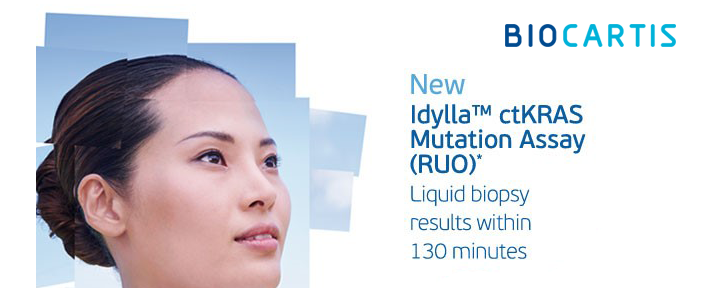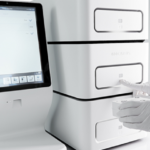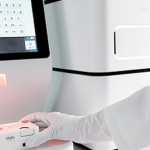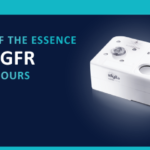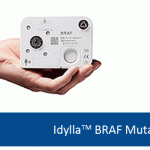Biocartis ctKRAS Mutation Assay (Research Use Only, RUO)
Products are for professional/laboratory use only.
The Idylla™ ctKRAS Mutation Assay (Research Use Only, RUO), was developed in partnership with the leading science and technology company Merck1 on Biocartis’ molecular diagnostics platform Idylla™. Designed to perform easy, sensitive and rapid KRAS mutation testing operating directly on 1ml of blood plasma, the Idylla™ ctKRAS Mutation Assay (RUO) is the second liquid biopsy assay on the Idylla™ platform, after the ctBRAF Mutation Assay.
Biocartis and Merck announced a partnership to jointly develop and commercialize new liquid biopsy RAS biomarker tests for metastatic colorectal cancer (mCRC). Access to rapid and easy-to-use molecular diagnostic tests is essential to understand individual cancer-driving gene mutations in mCRC, opening doors to timely cancer treatment decision-making. Liquid biopsy-based testing demonstrates clear benefits as it, contrary to tumor tissue-based testing, is minimally invasive, fast and easy to perform, and an attractive approach when limited or no tissue is available.
asdf
The Idylla™ ctKRAS Mutation Assay (RUO) is a fully automated sample-to-result assay that operates directly on 1ml of blood plasma. The assay is intended for the qualitative and sensitive detection of 21 KRAS mutations, with less than 1 minute of hands-on time and a turnaround time of approximately 130 minutes.
The Idylla™ ctKRAS Mutation Assay (RUO) further supports Biocartis’ colorectal cancer test offering, today consisting of the tissue-based Idylla™ KRAS Mutation Test (CE-marked IVD test) and the Idylla™ NRAS-BRAF-EGFR S492R Mutation Assay (RUO), both operating directly from a slice of FFPE2 tumor tissue. The Biocartis partnership with Merck also comprises the development of a second liquid biopsy test addressing NRAS and BRAF mutations to complete liquid biopsy ctRAS testing coverage in mCRC.
Erwin Sablon, Head of R&D and Alliance Management Biocartis, commented:
“Thanks to our partnership with Merck, Biocartis is able to offer its first liquid biopsy assay for KRAS mutation testing, operating directly on blood plasma. We are excited about the potential of this and future liquid biopsy assays, where research3 has shown in the past years that circulating tumor DNA can be used for disease monitoring in patients undergoing treatment.”
asdf
About liquid biopsy testing
Research over the last few years has shown that fragments of tumor DNA are shed into the blood from primary tumors or metastatic sites4. These circulating DNA fragments can be used for diagnostic purposes, such as providing molecular information for treatment selection, or for monitoring disease progression in patients undergoing treatment.
About Biocartis
Biocartis (Euronext Brussels: BCART) is an innovative molecular diagnostics (MDx) company providing next generation diagnostic solutions aimed at improving clinical practice for the benefit of patients, clinicians, payers and industry. Biocartis’ proprietary MDx Idylla™ platform is a fully automated sample-to-result, real-time PCR (Polymerase Chain Reaction) system that offers accurate, highly reliable molecular information from virtually any biological sample in virtually any setting. Biocartis launched the Idylla™ platform in September 2014. Biocartis is developing and marketing a rapidly expanding test menu addressing key unmet clinical needs in oncology and infectious diseases. These areas represent respectively the fastest growing and largest segments of the MDx market worldwide. Today, Biocartis offers six oncology tests and two infectious disease tests.
asdf
asdf
1. Merck KGaA.
2. Formalin-fixed paraffin embedded.
3. Diaz and Bardelli, Liquid Biopsies: Genotyping Circulating Tumor DNA. J clin Oncol (2014) 32: 579-586.
4. Diaz and Bardelli, Liquid Biopsies: Genotyping Circulating Tumor DNA. J clin Oncol (2014) 32: 579-586.



